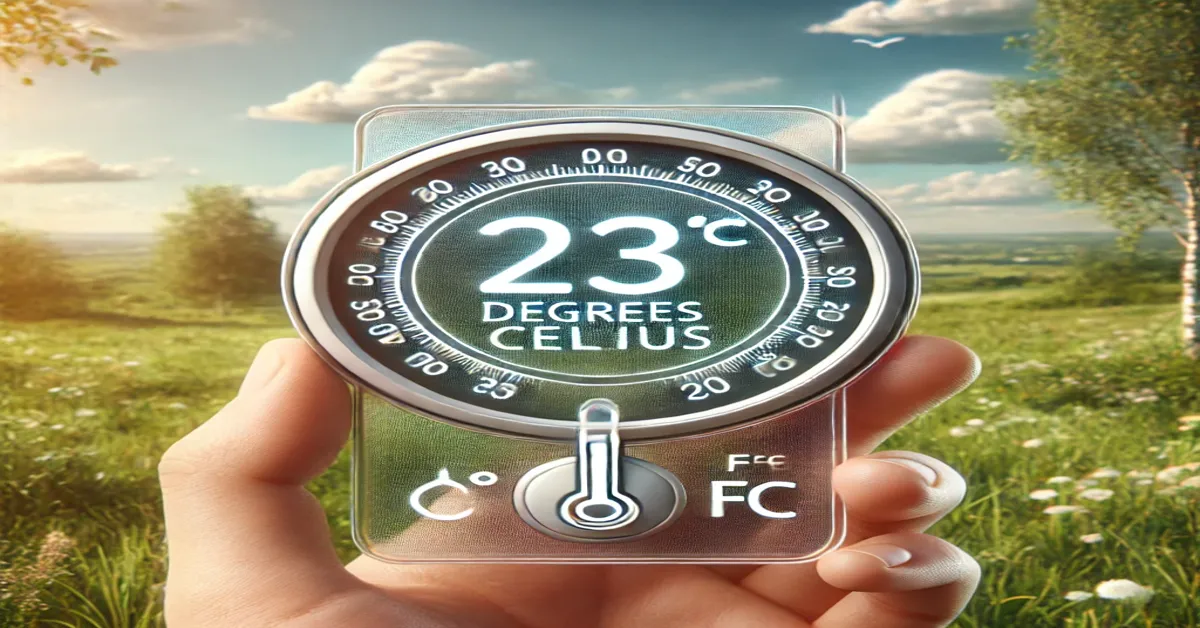Understanding how to convert temperatures like 23 Celsius to Fahrenheit is essential for navigating daily life, especially in a world where different regions use varying temperature scales. Whether you’re preparing for travel, following a recipe, or interpreting a weather report, mastering this conversion ensures clarity and precision. This article delves into the history, methods, and practical applications of converting 23 Celsius to Fahrenheit, offering a thorough exploration of the topic.
The Celsius and Fahrenheit Scales: An Overview
The Celsius scale, introduced by Swedish astronomer Anders Celsius in 1742, is based on the freezing and boiling points of water, set at 0°C and 100°C respectively. This metric scale is widely used globally, particularly in scientific and meteorological contexts.
The Fahrenheit scale, created by Daniel Gabriel Fahrenheit in 1724, places the freezing point of water at 32°F and the boiling point at 212°F. It remains predominantly used in the United States and a few other countries, offering a more granular representation of temperature changes.
ALSO READ:Convert 30 Degrees C to F: Comprehensive Temperature Guide
How to Convert 23 Celsius to Fahrenheit
The formula for converting Celsius to Fahrenheit is straightforward:
°F = (°C × 9/5) + 32
Let’s apply this to 23 Celsius:
- Multiply 23 by 9/5 (or 1.8):23 × 1.8 = 41.4
- Add 32:41.4 + 32 = 73.4
Thus, 23 Celsius converts to 73.4 Fahrenheit, a temperature considered mild and comfortable in many regions.
Practical Implications of 23 Celsius to Fahrenheit
1. Weather Interpretation
At 23°C (73.4°F), the weather is often described as pleasant. It’s ideal for outdoor activities, such as picnics, hiking, or casual walks. Knowing how to convert 23 Celsius to Fahrenheit helps travelers and locals alike interpret weather conditions accurately.
2. Cooking and Baking
Recipes from different regions often list temperatures in Celsius or Fahrenheit. Converting 23 Celsius to Fahrenheit ensures accurate oven settings, contributing to culinary success.
3. Energy Efficiency
Moderate temperatures like 23°C lead to reduced energy consumption, as there is minimal need for heating or cooling systems. This contributes to cost savings and environmental conservation.
The Historical Context of Temperature Scales
Celsius Scale
Originally, Celsius designed his scale with 0 representing the boiling point and 100 the freezing point of water. This was later reversed to align with today’s conventions.
Fahrenheit Scale
Fahrenheit developed his scale based on three reference points: the freezing point of a brine solution (0°F), the freezing point of water (32°F), and normal body temperature (initially 96°F, later adjusted to 98.6°F).
Why Are There Different Temperature Scales?
The coexistence of Celsius and Fahrenheit scales reflects historical and regional preferences. Celsius aligns with the metric system, making it the standard for scientific calculations. Fahrenheit, with its finer resolution, remains favored in the United States for its practical daily use.
Converting Fahrenheit Back to Celsius
To convert temperatures from Fahrenheit to Celsius, use the inverse formula:
°C = (°F – 32) × 5/9
For instance, to convert 73.4 Fahrenheit back to Celsius:
- Subtract 32 from 73.4:73.4 – 32 = 41.4
- Multiply 41.4 by 5/9:41.4 × 5/9 = 23
This calculation confirms that 73.4 Fahrenheit is equivalent to 23 Celsius.
ALSO READ:35 Celsius to Fahrenheit: Learn the Conversion and Its Uses
Tools for Converting 23 Celsius to Fahrenheit
1. Online Calculators
Web-based tools offer instant temperature conversions, making it easy to convert 23 Celsius to Fahrenheit.
2. Smartphone Apps
Apps with unit conversion features simplify the process, ensuring accuracy on the go.
3. Digital Assistants
Voice-activated assistants like Alexa, Siri, or Google Assistant can quickly provide conversions upon request.
ALSO READ:50°C to Fahrenheit: Conversion, Applications & Safety
The Relevance of 23 Celsius in Daily Life
1. Travel Planning
For travelers, understanding how to convert 23 Celsius to Fahrenheit aids in packing appropriate clothing and planning activities based on weather forecasts.
2. Academic and Professional Use
In educational and scientific settings, temperature conversions are frequently required. Mastering the conversion of 23 Celsius to Fahrenheit ensures clarity in research and communication.
3. Home and Garden Maintenance
Moderate temperatures like 23°C are ideal for gardening, as plants thrive in such conditions. Monitoring and converting temperatures can support optimal plant growth.
The Psychology of Temperatures Like 23 Celsius
1. Comfort and Productivity
Mild temperatures such as 23°C foster comfort and productivity. People often feel more energized and motivated in such weather conditions.
2. Perception of Warmth
Perceptions of 23 Celsius can vary based on geographic location and individual tolerance. In cooler climates, it may feel warm, while in warmer regions, it might be considered mild.
ALSO READ:36 F to C: Practical Temperature Guide and Applications
Conclusion
Converting 23 Celsius to Fahrenheit is a simple yet essential skill for navigating a world with diverse temperature measurement systems. From weather interpretation to energy efficiency and culinary precision, understanding this conversion has broad applications. By delving into the history, methods, and practical uses of these scales, we gain a deeper appreciation for their relevance in our daily lives.
FAQs
- What is 23 Celsius to Fahrenheit? 23 Celsius equals 73.4 Fahrenheit, a temperature often described as mild and comfortable.
- How do you convert 23 Celsius to Fahrenheit? Use the formula: °F = (°C × 9/5) + 32. For 23°C, it calculates to 73.4°F.
- Why is knowing this conversion important? It helps in interpreting weather forecasts, cooking, and understanding scientific data across regions with different scales.
- Is 23 Celsius considered warm? Yes, it is generally considered mild and pleasant, suitable for outdoor activities.
- Are there tools to convert 23 Celsius to Fahrenheit? Yes, you can use online calculators, smartphone apps, and digital assistants for quick conversions.
- How does 23 Celsius feel in Fahrenheit? At 73.4°F, it feels warm but not hot, often associated with spring or early summer weather.









